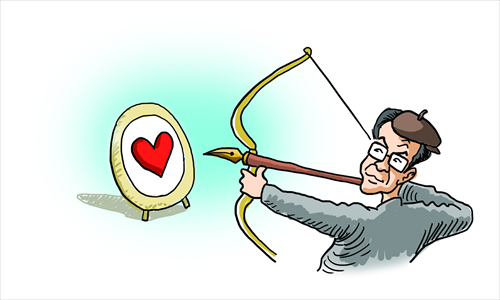South Korean dramas hit sensitive spots

Illustration: Liu Rui/GT
A well-heeled yet melancholic young man went to a Zen master for help, expecting to be helped to lead a spiritually refined and outwardly unassuming existence. The master stretched out his hands instead and said, "Tuhao, can I be your friend?"
As some Chinese court tuhao, a recently popular term for the nouveau riche with money to burn and time to kill, a South Korean TV drama irritated Chinese for its unfriendly portrayal of Chinese-style Beverly Hillbillies.
In the latest episode of Hotel King, a business tycoon, whose heavy accent betrayed his Northeast China origin, wore leopard-print leggings and thick gold chains, kept harping about fabricated lousy service and even got physical with a waiter.
His tacky wardrobe and crass behavior pricked Chinese nerves. "Why are our countrymen shown as uncouth upstarts?" questioned one netizen. Some called for a blockade of South Korean dramas that allegedly demean and defame Putonghua speakers.
This wasn't the first South Korean show to depict China and its people with jaundiced eyes. In some previous South Korean TV shows, China was depicted as a barren territory rife with ferocious mafia gangsters, light-fingered pickpockets and brazen con artists.
Commentator She Zongming believed it was South Korea's economic boom that bred the upsurge of cultural nationalism, manifested via movie or television plots like "China being inferior to South Korea" or "Chinese kowtowing to Koreans."
China claiming suzerain authority in East Asia harks back to days of yore, when the ancient empire's adjacent areas, Korea included, were intimidated by its power and prestige, and thus paid homage and tribute to the Middle Kingdom.
As the wheel of pop history turns, South Korea has risen to prominence. The Korean pop wave has long swept its way through the circle of Confucian culture and swept zillions of overseas fans off their feet.
Little wonder Korean playwrights may sometimes sweep aside the reality of China, creating a fool's paradise in which its patriotic ego is bloated to the size of a mountain while its former leader is laid low in the dust.
However, amid the catcalls from indignant Chinese, some people were also tickled to see the country's rich being rendered on screen in such a hilariously graphic manner.
There was no denying it hits the spot: China's economic royalty, for all their newly minted wealth, have god-awful track records of law-abiding and respecting others.
These fat cats are often dressed up like a dog's dinner, unable to pull off any decorous, urbane luxury brands; they drive eight-figure, gilded limos, but bear zero road sense; they bring a large entourage in tow, but never bother to cast an eye on the have-nots.
They reek of pecuniary arrogance and gaudy taste, and are as derided in China as elsewhere.
Therefore foreign TV series do have a kernel of hard truth. Scholar Lu Guoping holds that Chinese need to do introspection and make positive changes, rather than label Korean producers as merely slandering their country.
In some cases, our nationals wrap their tender dignity in barbed wire, jumping a foot in the air when anything from abroad touching the raw nerve, even when enjoying entertainment shows.
A China's A-list actress was flayed at home for acting the role a geisha who slept with a Japanese man for money in the film; a Hollywood blockbuster received an avalanche of complaints because a Hong Kong star shown was a bald, rotten-faced, long-whiskered pirate; and the creators of a US sitcom had to apologize for having three characters donned yellow face and robed in Chinese attire, after the Asian community voiced their frustration on social media.
Odder still, while Chinese regarded these as foreigners' cheap shot to dent our national confidence, we hardly hear of the British boycotting Pirates of the Caribbean in which the UK royal navy was haughty and incompetent, or Koreans protesting against the image of one of their citizens in US hit sitcom 2 Broke Girls as an undersized, lily-livered, stingy greasy spoon owner.
Maybe a little less national sensitivity and a little more attention to producing dramas of our own would bolster patriotic pride more.
The author is a Shanghai-based freelance writer. opinion@globaltimes.com.cn